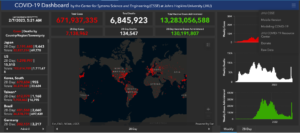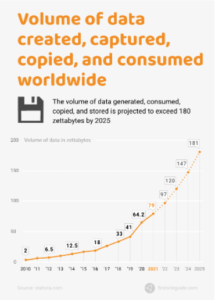A New ‘Crisis of Confidence’
“He was a prophet who did powerful miracles, and he was a mighty teacher in the eyes of God and all the people…We had hoped he was the Messiah who had come to rescue Israel.”[1]
In reviewing the dialogue that Jesus’ followers unwittingly had with him after his resurrection, Oswald Chambers writes: “Every fact that the disciples stated was right, but the conclusions they drew from those facts were wrong.”[2]
How to Read Numbers was an intriguing choice for our reading list, and in today’s information age it is certainly relevant. Should I get rid of my GAS STOVE? What should I think about IMMIGRATION? What is going on with INFLATION? Do I need to WEAR A MASK? To be a responsible citizen in this world, we need information, yet that information is growing more bountiful and complex by the second.
A quick Google search on the increase of data over the years brought up a lot of stories (more data) including this chart: [3]
The main takeaways for me on this chart are:
- Never have we been asked to process the amount of data that we are today.
- The need for being able to manage information will only increase in the future.
- Consuming data is relatively new skill, so we need to get better at it.
In this week’s reading, I had a couple of parallel thoughts running through my mind:
- First: “I wish I had paid more attention in my statistics class.”
- Second: “What is the ‘so-what’ for us as students in a global leadership program?”
Seeing Through the Dim Mirror of Statistics: Data Consumption is Hard
I cannot help but reflect on how many obstacles we face in reading data right. We read in Chivers that a group of psychology students, who have presumably been instructed in the subject, as well as their instructors, misunderstand the concepts of statistical significance.”[4]
Without confidence in the information we are given, we can (and should) question everything, slowing down progress. Meanwhile, overconfidence in bad information, can lead to our making bad decisions, like, say, donning horned helmets and storming the capital. [5] When we don’t have a right understanding of the data we have, dangerous things can happen.
Crisis of Confidence: Society Needs Good Information
In 1979, Jimmy Carter spoke about a Crisis of Confidence[6] as the nation was facing an energy crisis and looming inflation. Today, we are operating a new crisis: we are easily led astray by misinterpreting the data that is flooding through the information we consume.
Our Context Impacts Our Interpretation of Data
At work, during COVID, we all had to take on different roles. I was given the dubious title of Planning Chief, which was a Command Center role[7]. In this job, I tracked numbers. Daily. Numbers relating to community incidence of infection, testing rates, levels of Personal Protective Equipment stocks, employee sick calls, unstaffed shifts and most importantly, predictions of future infections levels. I must say it felt a bit like we had fallen down a dark version of Alice’s rabbit hole. Not an expert myself, I did find that dusting off the learnings I had gleaned in my master’s degree in Public Health and 20-years of hanging out with medical professionals gave me something of a confidence. My background was my context. What I observed was that my friends and family outside of work who did not have that background and were not tracking these numbers daily, had a different view of the situation than I did. At its core, we were looking at the same situation from two very different angles.

Figure 1: A Screenshot of one of the points of data I reviewed daily while I supported my organization’s response to COVID[9]
Leaders shape their environments by what they chose to measure and how they measure it.
Like Christ’s followers in Luke, we can get the facts right and at the same time not fully understand the truth of what we see. On January 31st, 2023, it was reported that the United States is preparing to end the Emergency Declaration associated with the COVID pandemic.[10] With this change, we will be also changing the data that is being monitored. COVID will not be going away- we just will not be documenting it with the same rigor of the past 3 years. That change in attention will have big effects on our society.
The point is this: when we monitor something, it is seen as important. When we stop monitoring it, it doesn’t get attention.
___________________________________________________________________
More thoughts (that are outside my word count):
- If you haven’t already, you need to listen to Travis Vaughn’s podcast. In an early episode, Travis interviewed a Kim Muhich, who had some great tips on how to consume information wisely, specifically, how she strives to read news from a variety of sources. Key quote for me: “The people who know the most are the first to say how much they don’t know.”[11]
- Did you know that the US is an outlier in bad news reporting? For an interesting read, you can review Bad News Bias from the New York Times. [12]
- To add to the complexity of reading data, as humans, we also have no problem taking on misinformation with limited or faulty data. In one of our earlier reads, Being Wrong: Adventures in the Margin of Error, Kathryn Shultz writes that “believing things based on paltry evidence is the engine that drives the entire miraculous machinery of human cognition”[13] Disinformation and misinformation is a separate, but related topic, which is important too. Richard Stengel (again, from the New York Times) shares some intriguing titles on the subject[14]
[1] “Bible Gateway Passage: Luke 24:19-21 – New Living Translation,” Bible Gateway, accessed February 7, 2023, https://www.biblegateway.com/passage/?search=Luke%2024%3A19-21&version=NLT.
[2] “Are You Fresh for Everything? | My Utmost For His Highest,” accessed January 20, 2023, https://utmost.org/are-you-fresh-for-everything/.
[3] “30+ Big Data Statistics (2023) – Amount of Data Generated in The World,” FirstSiteGuide, December 20, 2021, https://firstsiteguide.com/big-data-stats/.
[4] Tom Chivers and David Chivers, How to Read Numbers: A Guide to Statistics in the News (London: W&N, 2021). 39.
[5] Trish Bendix, “The Best of Late Night This Week 🌙,” The New York Times, November 19, 2021, sec. Arts, https://www.nytimes.com/interactive/2021/11/19/arts/television/best-of-late-night.html.
[6] “Crisis of Confidence” Speech – Jimmy Carter, 2013, https://www.youtube.com/watch?v=PYWqveU1Tdk.
[7] “Command Center,” in Wikipedia, February 11, 2022, https://en.wikipedia.org/w/index.php?title=Command_center&oldid=1071284762.
[9] “COVID-19 Map,” Johns Hopkins Coronavirus Resource Center, accessed February 7, 2023, https://coronavirus.jhu.edu/map.html.
[10] Sharon LaFraniere and Noah Weiland, “U.S. Plans to End Public Health Emergency for Covid in May,” The New York Times, January 31, 2023, sec. U.S., https://www.nytimes.com/2023/01/30/us/politics/biden-covid-public-health-emergency.html.
[11] “VOYAGER: A Vaughn Group Podcast on Apple Podcasts,” Apple Podcasts, accessed February 6, 2023, https://podcasts.apple.com/us/podcast/voyager-a-vaughn-group-podcast/id1562257753.
[12] David Leonhardt, “Bad News Bias,” The New York Times, March 24, 2021, sec. Briefing, https://www.nytimes.com/2021/03/24/briefing/boulder-shooting-george-segal-astrazeneca.html.
[13] Kathryn Schulz, “Being Wrong: Adventures in the Margin of Error” (New York: Ecco, 2010).114
[14] Richard Stengel, “Misdirection, Fake News and Lies: The Best Books to Read on Disinformation,” The New York Times, June 9, 2022, sec. Books, https://www.nytimes.com/2022/06/09/books/books-disinformation-fake-news.html.
9 responses to “A New ‘Crisis of Confidence’”
Leave a Reply
You must be logged in to post a comment.


Hi Jen,
I had an interesting experience last week that challenged one of my assumptions which is similar to your statement, “Our Context Impacts Our Interpretation of Data.” My assumption was that, as an egalitarian church, the vast majority of people would not be stressed out by one of our female Pastors preaching….that’s been our church culture for a while. So I was a bit surprised when an earnest 20 year old guy who is friends with my son texted me to express his concern about a female teaching and asking how that decision was made (please note all readers: I’m not interested in engaging in that debate…nor is it the point of this comment!). Like any Pastor, I found his text to be a great reason to enjoy a Starbucks coffee and chat things through. What came out during that conversation was his great enjoyment of listening to a certain complimentarian pastor/preacher online. One of his other friends was likewise listening to a very conservative pastor online and, together, they were arriving at a certain theological conclusion. This young man grew up in our egalitarian church and also attended another local church in the evenings on occasion that was also egalitarian. His context was egalitarian, his Pastor (the one one up front on a Sunday) was egalitarian….but he determined that the complementarian position made the most sense. Why? In such a case, it doesn’t seem as related to context, as to authority. Who has authority to speak into this young man’s life? He determined the online speaker/pastor did…and consequently his context was then assessed through his newly adapted worldview.
It’s interesting Pastoring/leading people when they have their ‘favourites’ authors and online teachers and you, as the physically present leader, are afforded some degree of authority, but only inasmuch as you align yourself with their particular expert!
All that to say…I still think context deeply shapes us as individuals, but the radical increase of data and information available to all of us (which you mention in your post) at least creates more opportunities for variances within a particular culture (perhaps for good and bad) as people connect to information outside of their cultural context.
It will be very interesting to watch how this overload of information both unifies and fractures communities in unhealthy and healthy ways in the coming years…
Well, now you have me questioning the definition of “context.” When I think of context, I think of all the things that influence us. So, in your example, would it be fair to say that part of his context was his home church, but another part was his age and the other voices of influence (a.k.a. internet) in his non-Sunday world?
It’s like that saying we have all heard that the pastor gets his congregation for a 20 minute sermon on Sundays, while Fox (or CNN) news has them for the rest of the week… or something like that.
“Context…all the things that influence us.” What a great thought Jennifer! I have naturally confined ‘context’ to more spacial, relational and cultural aspects of life…but your reply opens new vistas to consider! At the very least, you point out the importance of giving context to the word ‘context’! (Perhaps ‘definition’ is the better term….but not quite the word play!). Appreciate the response.
Jennifer,
Your comments really demonstrate to me the parameters of “critical thinking.” Using the examples from your work place really give credibility to your comments and place you in my “influencer box.”
Also thanks for the link “Voyager”…
This morning, I plowed through the State Department, Department of Homeland Security, New York Times, Border reports…the data is almost overwhelming. I imagine that you give some sort of weighting criteria to the resources that flow your way? I want to avoid Bias in my data collection (as Chiver(s) warns. Any thoughts on how you weight the resources?
While describing a rather tedious subject. I find Chiver(s) hilarious…The richer we get, the fatter we get and apparently emit more gas…(the story of my life). Thanks for your comments…Shalom…Russ
You are very kind.
I struggled with this post because there is SO much technical information there, and I think a lot of leadership is really about knowing who the experts are that you trust. I am NOT a data expert, but I am good at phoning a friend. Which gets me to your question about how I weigh data sources.
Trust is important. So, when I look at a report, (if I am clear-eyed and not getting sucked into the “oh no the sky is falling” trope of news) I have a couple of go to considerations:
– Who do I know that is smarter about this than I am and can help me interpret it?
– Who paid for this study, and what might their priorities be? Why did the researchers conduct this study?
– What is the sample size, and is it a stand-alone study, or a compilation of several studies that repeat the trends?
– How is the study proving causation over correlation? I am sure that you are aware that there has been some scuttlebutt about how we count people who are hospitalized BECAUSE of Covid vs WITH Covid.
Last, random thought: My husband (also my editor) has been thinking about this topic this week as well. He has his graduate degree in a science field and has published his own studies. He came bursting into my office this morning and reminded me that we also have our own bias in selecting the studies we want to agree with. That is convicting. Maybe there is something about digging into the studies that we find challenge our preconceptions?
What do you think?
Jennifer,
Look at the increase of data over the years. WOW!! I know that in my workplace we look at a lot of student performance data to make better decisions about how to meet their academic needs. What the data doesn’t show is the number of children who didn’t have breakfast before coming to school the day before taking the state assessment? Or maybe the data doesn’t show the many unmet needs of our children and families that cause significant gaps in achievement? To get to the bottom of those decisions, data doesn’t seem to help, relationships do.
I hit “post” before mentioning a pondering that occurred to me. . .
What are the correlations between the rise in data consumption and the rise in the number of people struggling with worry and severe forms of anxiety?
“Leaders shape their environments by what they chose to measure and how they measure it”
That statement is worth the price of admission! I realize that is what I was attempting to say but never quite got around to saying in my post. It’s not that numbers are bad, or counting things is bad, but as leaders how we use numbers and metrics and statistics is as powerful a force as our words are.
There is so much to engage with on this post Jennifer. So solid. This is the kind of writing that I would expect to find in a reputable newspaper or news magazine. Really impressive.
The quote from Travis’ podcast: “The people who know the most are the first to say how much they don’t know.” Wow. I’m glad you exceeded your word count to drop that in there. That speaks to humility, which I see as a major component to this whole thing. Humbly being able to admit: “I might be wrong.” Those four words are huge. Could you imagine how different the last few years would have been if more people in authority, media outlets, heck, even family members, pastors, and congregates, would say these words? I might be wrong. I feel challenged even now to integrate these words into my conversations and sermons more often.